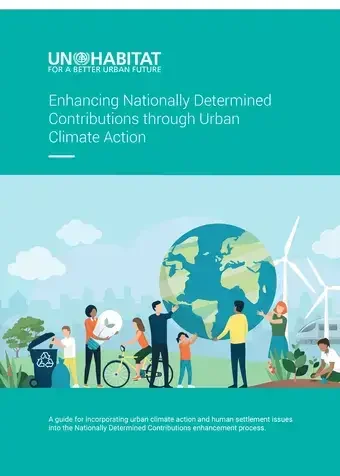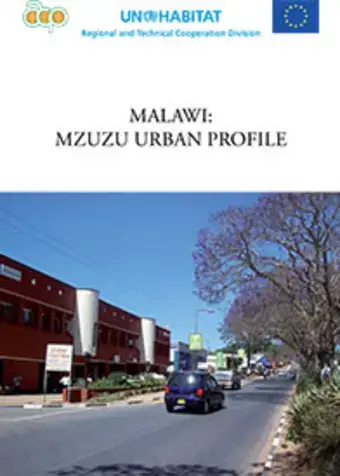Overview
Malawi is one of the fastest urbanizing countries in the world with an annual urban growth rate higher than five percent and an urban population of 20% of its entire population. Absolute urban growth in Malawi will exceed rural growth before 2025 with an urban population increase of 214,000 per annum during 2020-2025 compared to 193,000 in the rural areas.
Urban planning in Malawi was delegated to the cities of Blantyre, Lilongwe, Mzuzu and the Municipality of Zomba in 1992. The Local Government Act of 1998 obligated all assemblies to draw up plans for the social, economic and environmental development of their areas. Urban planning in Malawi has traditionally been based on the structure planning concept demarcating the urban space into land use zones.
Land in Malawi is governed by the Land Act of 1965 and the Registered Land Act of 1967. Various land and land related bills are yet to be enacted by Parliament in order to operationalize the Malawi National land Policy of 2002, which seeks to ensure tenure security and equitable access to land and its sustainable use.
The most significant urban sector challenges facing Malawi today are rapid urbanization and growing urban poverty. The rapid urbanization has led to a pressing housing demand that far exceeds the rate of new housing delivery. As a result, 80% of the demand is met through informal housing, resulting in insecure tenure, poor quality of housing and overcrowding.
“Urban resilience has often not been prioritized by different actors in the country. The perception that urban areas are less vulnerable has contributed to this. There is, however, a change in perception taking place. UN Habitat’s work in urban resilience, including the work on resilience assessment and planning through the CityRAP tool is very commendable. As government, we hope we will see more players supporting urban areas in building resilience to climate change and disasters, particularly now when we are seeing more frequent and severe disasters in urban areas”
James Chiusiwa
Director of Risk Reduction, Department of Disaster Management Affairs, Office of the Vice President, Malawi
Country: Overview
Country: Overview
Country: Overview
As of 2018, 16 percent of Malawi’s population reside in urban areas, slightly increasing from 15.3 percent in the 2008 census, where 12 percent are in Malawi’s four cities of Mzuzu, Lilongwe, Zomba and Blantyre and the remaining two percent reside in town and municipal councils. Limited revenue collection and planning capacity, weak governance structures, poor land use planning, threat of climate change and disasters, high levels of informal settlement and unregulated developments are major challenges affecting sustainable urbanization in Malawi.
Informal settlement in Malawi’s four cities range between 60 and 75 percent, with an average of 65 percent of the urban population living in informal settlements. In recent years, the country has witnessed an increase in the frequency and magnitude of disasters in urban areas, most of which linked to climate change and variability and a manifestation of poor planning, limited drainage system, inadequate and unregulated waste disposal and settlement in high risk areas.
Urban Population (2018): 16.9%
Urban Growth Rate (2015-2020): 4.19%
Our work
Featured Stories & Videos
Donors
Partners
Contact
Highlighted Publications
Legacy content
- Total value of UN-Habitat investments (2008-2015): US$ 1,752,113
- Total number of UN-Habitat projects (2008-2015): 6 projects
- Main donors: IBRD World Bank,UNDP Malawi, Cities Alliance and FAO, European Commission and the Africa, Caribbean and Pacific Secretariat
- Implementing partners: FAO, COOPI, CARE, UNDP, CCODE, UNDP, Habitat for Humanity, Christian Aid
In the period between 2008-2013, UN-Habitat had activities in Karonga, Nsanje Chikwawa District, and a slum upgrading and city development strategy project in Blantyre, Lilongwe, Mzuzu and Zomba.
General information
Population: 15.91 million
GDP: US$4.264 billion
GDP growth: 1.9%
Urban population (annual %): 16%
Population growth rate (average annual %): 2.9%
Urban population growth rate (average annual %): 3.8%
Rural population growth rate (average annual %): 2.7% Source: World Bank, 2012
Major cities: Malawi is divided into 28 districts within 3 regions. Its major cities are Lilongwe (capital), Blantyre, Zomba, Kasungu, Mangochi, Karonga, Salima, Nkhotakota, Liwonde and Nsanje.
UN-Habitat projects in Malawi
Improving Water Supply, Sanitation and Hygiene Promotion in Peri- Urban Areas of Mzuzu City and Karonga Town in Malawi
Objective of the project
The overall objective of the Action is to contribute to poverty reduction and an improvement in livelihoods for the target population. The specific objectives are to:
- Increase access to safe water supply in the informal settlements of Mzuzu and Karonga.
- Increase access to basic and improved sanitation in the informal settlements of Mzuzu and Karonga.
- Promote hygiene and sanitation awareness in the informal settlements
- enhance the capacity of local institutions and communities to sustainably operate and manage water and sanitation facilities as well as hygiene promotion programmes
Main Components of the Project
The safe water supply component involves, rehabilitation of the facilities, extending the network, construction of water kiosks and installation of group connection in informal settlements, and installation of water connections to schools.
The sanitation component involve the construction of gender sensitive toilet blocks for the target communities and schools, construction of ECOSAN toilets in market places and construction of biogas digesters in selected places.
The Hygiene Promotion incorporates the aadaptation of Community Led Total Sanitation (CLTS) and School Led Total Sanitation (SLTS) approaches to the context of peri-urban environment. It also establishes a campaign in the target peri-urban areas to promote the social norms of using latrines and not defecating in the open this component is crucial for the creation of demand for success of subsequent project activities. This will ensure improved safe water handling from the source up to the point of use and proper use of sanitation facilities and disposal of faecal wastes.
The Capacity Development action has been embedded into the project to enhance sustainability of the interventions and improved the service delivery in the targeted towns. Relevant local institutions will be fully involved, their capacity needs identified and relevant trainings provided as necessary.
Methodology
The implementation process will follow the established procedures of UN-Habitat, drawing on experiences and lessons learnt from similar projects that have proven to be effective. Accordingly, Agreement of Cooperation (AoC) for the water components has been signed with the Northern Region Water Board (NRWB) and for sanitation and hygiene component with the Center for Community Organization and Development (CCODE)
A Steering Committee, composed of key partners, has been established. The Committee is responsible for the overall strategic guidance on the implementation of the action and. it meets quarterly to monitor progress, resolve problems, approve work plans and keep work on track. UN-Habitat, in close collaboration with the Steering Committee, has the responsibility of monitoring and evaluation of the implementation as well as providing technical and administrative assistance to the partners. Also, UN-Habitat has established a project management team that is responsible of project follow-up, supervision and management activities.
The project will adopt a comprehensive approach where water supply, sanitation, hygiene and capacity development interventions will be embedded together to enhance improved and sustainable service delivery.
Service sectors covered by the project include: Water, Sanitation, Hygiene Promotion and Capacity Development
Duration: January 2015 to 31 December 2016
Value: The total value of the project is Euro 2,053,298 and 45% (EURO 923,005.29) is contribution made by European Union. The remaining balance (55%) is the contribution made by other partners (Northern Region Water Board, Mzuzu City Council, Karonga District Council, Center for Community Development, and UN-Habitat)
Donor: European Union, UN-Habitat and Local Partners (Northern Region Water Board, Mzuzu City Council, Karonga District Council, Center for Community Development)
Implementing Partners: UN-Habitat, Mzuzu City Council, Northern Region Water Board, Karonga District Council, Centre for Community Organization Development (CCODE), and Mzuzu University
Urban Household Sanitation Improvement Project, Lilongwe City, Malawi: the overall Goal is to improve the living conditions of the urban poor by facilitating access to affordable and environmentally friendly sanitation facilities, better sanitation practices, personal hygiene and food security through better management of human excrements.
Support to Living with Floods in Chikwawa District, Lower Shire Valley, Malawi: the overall goal is to reducevulnerability to floods of communities living in low lands prone to low and moderate flooding byreinforcing local capacities and applying sustainable coping solutions through innovative small-scale mitigationinterventions for floods to support the alternative strategy of Living with Floods rather thanrelocation.
Malawi City Development Strategy and Slum Upgrading Programme Phase: to improve the lives of poor people living and working in the slums and informal settlements in urban areas; to build capacity of government. Local authorities and communities to effectively address poor living conditions in the slums and develop strategies to reduce further slum growth.
Support the Establishment of a Technical Centre for Disaster Risk Reduction and Climate Change Adaptation for Southern Africa (DIMSUR): the main project objective is to support the establishment of the DIMSUR with the mandate of providing DRR and CCA assistance and knowledge to address the needs of national programmes, and therefore reduce the vulnerability and build the resilience of communities to natural hazards.
Regional multi-sectoral DRR assistance programme for Southern Africa (UN-Habitat Basic Infrastructure, Shelter and Urban Risk Assistance): Analysis of food security risks and vulnerabilities in hazard prone urban and peri-urban areas, and develop alternative tools for participatory planning, land use and building norms to address food security related issues.
Donors: The donors for these projects were mainly the European Commission, IBRD World Bank, UNDP Malawi, Cities Alliance and FAO.
Implementing partners: UN-Habitat worked with several partners namely FAO, COOPI, CARE, UNDP, NGO CCODE, UNDP, Habitat for Humanity, Christian Aid to name a few.
Participatory Slum Upgrading Programme
The Participatory Slum Upgrading Programme aims at improving the lives of slum dwellers by addressing the five deprivations that characterize a slum namely, inadequate water; sanitation; durability of housing, overcrowding and tenure insecurity. Interventions are underpinned by three cross-cutting and complementary approaches: gender approach, human rights based approach, and results-based management approach. Results will add value to the development of policy, institutional, legislative, financial, and normative and implementation frameworks.
- Implementation Phase: Phase III
- Duration: 2009 - December 2015
- Value: US$250,000
- Donor: European Commission and, the Africa, Caribbean and Pacific Secretariat
- Implementing Partners: UN-Habitat and Ministry of Local Government and Rural Development
- Profile cities/ location: Cities/ towns of Blantyre, Lilongwe, Mzuzu and Zomba
Images












